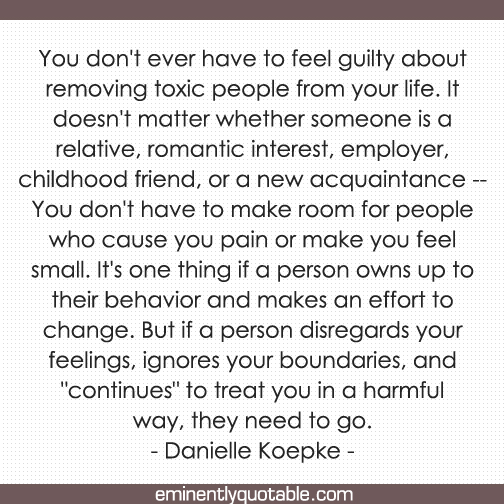
graphic © eminentlyquotable.com
“You don’t ever have to feel guilty about removing toxic people from your life. It doesn’t matter whether someone is a relative, romantic interest, employer, childhood friend, or a new acquaintance — You don’t have to make room for people who cause you pain or make you feel small. It’s one thing if a person owns up to their behavior and makes an effort to change. But if a person disregards your
feelings, ignores your boundaries, and “continues” to treat you in a harmful way, they need to go.” – Danielle Koepke
According to a recent research from the Department of Biological and Clinical Psychology at Friedrich Schiller University in Germany, stress causes people’s brains to have a massive stress response. Exposure to stress can have a lasting, negative effect on the body especially the brain. Even a few days of stress compromises the effectiveness of neurons in the hippocampus which is in charge for reasoning and memory. If prolonged for weeks, it will cause irreversible damage to neuronal dendrites, and months of stress can permanently destroy your neurons. Exposure to stress will not only damage your body but your performance as well.
There are many types of toxic people that we sometimes don’t realize that we’re working, hanging out, and living with one of them. Basically, toxic people are bearers of negativity. Psychologists warn that the friend who complains a lot may be using you to unburden by passing down their negativity. As mentioned in the previous paragraph, it is not worth the risk. So how do we deal with them?
Dr. Steve Albrecht, in his Psychology Today article, recommends staying away from toxic people especially if they themselves aren’t willing to change. But when it comes to toxic employers/employees/co-workers, you don’t have to quit your job but certain boundaries should be made clear. He also suggests opening up to an authority who can help improve the situation. Help is available, he says.
A happier and healthier life is possible if you are “with those who bring out the best in you, not the stress in you.”
😳 What Tinnitus Does To Your Brain Cells (And How To Stop It)
After 47 years of studies and countless brain scans done on more than 2,400 tinnitus patients, scientists at the MIT Institute found that in a shocking 96% of cases, tinnitus was actually shrinking their brain cells.
As it turns out, tinnitus and brain health are strongly linked.
Even more interesting: The reason why top army officials are not deaf after decades of hearing machine guns, bombs going off and helicopter noises…
Is because they are using something called "the wire method", a simple protocol inspired by a classified surgery on deaf people from the 1950s...
★ How To Get Rid Of Nail Fungus:
★ Does Your Salad Contain This Vegetable?
★ Top 10 Most Valuable Medicinal Herbs:





